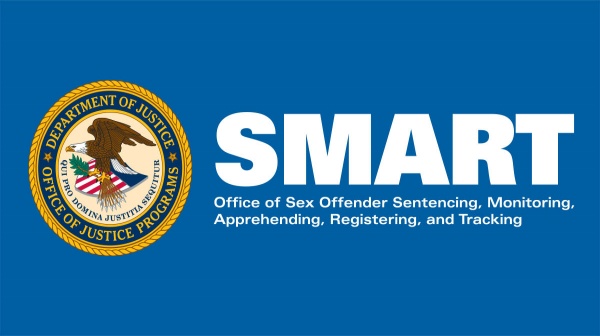By NARSOL Larry and Sandy . . . Not since the initiation of International Megan’s Law (IML) has anything raised such a level of anxiety, confusion, and questions as have the new federal SORNA/AWA guidelines that will become effective January 7, 2022. The only consensus seems to be that whatever happens, it won’t be good.
These recent amendments are not anything new in terms of actions taken by the U.S. Department of Justice (DOJ) to implement the Adam Walsh Act (AWA). The DOJ was tasked by Congress to promulgate regulations which guide the states with implementation of the AWA. Although the AWA was passed and became law in 2006, only eighteen states have thus far been deemed “substantially compliant.”
Many of our advocates mistakenly believe that the remaining states have rejected the AWA. Rather than this being the case, the non-compliant states. for the most part, have not rejected the AWA. In fact, the majority of non-compliant states have submitted request packages to the SMART office (Sex Offender Monitoring, Apprehension, Registration and Tracking) in Washington, DC. The status of each state can be checked here. Clicking on the “implementation review” link will show where the state falls short as well as revealing whether or not the state has applied for compliance.
As for what these amended guidelines are designed to do, the one-sentence answer is that they are intended to assist those states and jurisdictions that desire to become substantially AWA compliant an easier path to accomplish that goal.
A logical question might be which states are the most likely to adopt the new guidelines and which might be least likely. The answer to this is not as speculative as it seems; states that want to be in compliance might well use this as an opportunity to accomplish their objectives with administrative implementation.
However, if a state has a number of significant areas in which it is not up to the federal SORNA standards, just saying, “Yes, we accept the new guidelines,” is not sufficient. All that would do is make it legal to implement the standards. To be compliant, they would have to actually implement them, and that will be more difficult if there are many shortcomings because legislation would be necessary.
So which states might be less likely to adopt these guidelines? Some states, especially the southern ones, already have a registry that exceeds federal AWA requirements in some areas. They may have felt no need to seek compliance, or they may have been turned down on their original application because of a shortcoming in an area they have no intention of rectifying, such as registration of juveniles, for example.
States with a great many deficiencies and deviations from AWA requirements are probably less likely to seek this avenue. Even though they may wish to be compliant, they may face too many difficulties, for a variety of reasons, in actually implementing their registries so that they are acceptable for compliance to the SMART office.
Some states have provisions in their constitutions that prohibit a federal SORNA requirement. Maryland’s constitution, for example, states that no disadvantage can be imposed ex post facto to its citizens, and attempts to impose some of the AWA-required elements have been shot down not once but twice by their highest court, making it less likely that they will try again. The key is their ex post facto provision is broader than that in the U.S. Constitution, so Maryland chooses to provide more protection. So do a number of states. Any state constitution can provide more protection that does the U.S. one; it just can’t provide less.
The same is true with these federal SORNA requirements. A state can do more than required and be compliant; they just can’t do less. These are recommendations to the states. If a state wishes to be fully funded, without any loss of funding, it will do at least these things. It can do more but not less.
However, each state is independent with the right to self-govern. Any state that wishes to do so can add amendments that grant its citizens greater protection, such as Maryland and others have done. Adding constitutional amendments to a state’s constitution is a difficult task but not impossible.
Another question that has arisen regarding the revised AWA guidelines is if they have the potential to affect every person with a previous sexual crime conviction. The federal definition of a person required to register is anyone who has ever been convicted of a sexual crime, even those pre-registry who never had to register. States are highly unlikely to go looking for these individuals, but if they come to the attention of the criminal justice system with any type of felony conviction and they had an old conviction for a sexual crime, they must, according to the federal SORNA scheme, be added to the registry. This too is confusing because if the person’s offense is a Tier I or Tier II, enough time may have passed that the state would not be required to capture that person.
And then the question becomes if it wouldn’t be unconstitutional to redefine who does and doesn’t have to register due to an administrative implementation. This is entering even deeper into unknown territory. Everything a branch of the government does is considered to be constitutional. It isn’t until litigation takes places and a court declares it unconstitutional that the question is answered.
Therefore, a state’s becoming compliant with the Adam Walsh Act through administrative fiat is likely to usher in a fresh new set of lawsuits, something that those of us in this advocacy enthusiastically welcome.

This article was reprinted with permission from NARSOL.org




What are the new requirements of the new laws on January 7 2022, what well happen.
Thanks William
Thanks for the comment, William. Please see the detailed email I sent to you.
I would like to find out how this will affect me.
Thanks for the comment, Charles. Please see the detailed email I sent to you.
Please email me as well about the new laws? Mrs B.Cricks
I thought the purpose of SORNA was to evaluate the offense the person was charged with, and place them in the tier system, which most states don’t use. Here in WV, it doesn’t matter what your offense was, we’re all thrown in one basket, witch means if you’re guilty of urinating in public, you’re just as guilty as a child rapist. I get the feeling there’s more to it than that and not in our best interests. Pretty soon they’ll run out of ways to restrict SO’s more so they’ll go back to public hangings. Better not say it too loud, they might like the idea !
Some states continue to say a sex offenders rights are diminished more so then any other convicted felon.thats
Not true,once ur off probation and or parole.ur a free citizen
And most importantly the fact that ur on the sex offender
Registry does not reduce ur rights,because as all states
Constantly say.”this is a nonpunitive civil registry”and its
Not punishment.!!! Therefore a state cannont argue that a free citizen taking part in a civil nonpunitive registry loses any of his rights besides 2nd amendment,same as any other felon.so therefore the registry clearly violates ones
14th amendment.its clearly.” A deprivation of ones liberty!!
hi! my name’s earl, and i guess that i’m a megans law registrant here in WV for life?
my original conviction was in ’99. i did 10 1/2yrs for a 3 to 8 sentence because i was on parole at the time, and i’ve proclaimed my innocense the whole time. so i had to do every second. i used to be a crackhead back in the late 80s thru the 90s that caused me lots of trouble.
so i’ve been out since ’09 with not a blemish.
quite the opposite! i’ve not had any girlfriends since about early ’12. in fact, my plumbing hasn’t worked since then…
this crap just keeps affecting every aspect of my life. i haven’t been able to promulgate any type of serious relation with a woman since my release. as soon as a woman finds out, there goes the bath water and the baby!
these girls have families, and the stigma is that we’re all predatory monsters!
no one, not one company will hire me – even like grubhub or instacart!
is there any chance that guys like me, coming up on 14yrs clean, will ever be able to move on?
Hi Earl,
There is hope; there is always hope. I know some registrants that find and have fulfilling relationships and fulfilling jobs. I know/feel it’s probably 75% don’t to 25% do, so you just have to keep working and striving to get into the 25% … easier said than done; I know. But the short answer is yes “there is a chance guys like you can…”
I’ll tell you the worse thing that’s ever occurred in my life.. I got off the sex offender list in Maryland, I was a tier 1 at one Point! I moved to be with my family in Hampshire county West Virginia, I got charged with a failure to register I had to do 9 months for it! Then got 7 years of probation for it! I waited so long to move back home with my family til I got off here in Maryland so I could reunite with my family my dads 75 my moms 74 there not getting any younger it’s hurts my heart every day! I have a simple misdemeanor & wv told me I would have to register for life there! So I moved back to Maryland because I don’t have to register here in the state.. My whole family is so hurt that I had to leave I never seen them so upset! But the laws in West Virginia are there to just set you up and keep you in the system! The crazy Part is I’m on Probation in Maryland now for 7 years while I don’t have to register here in the state of Maryland. Anyone going through something like this I feel so bad & I wish the the best & to stay strong. I feel so lonely & lonely without my family